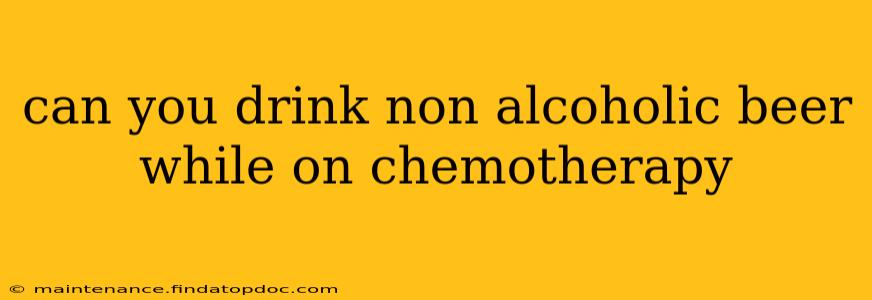Can You Drink Non-Alcoholic Beer While on Chemotherapy?
Chemotherapy can be a challenging journey, and many patients seek ways to maintain a sense of normalcy and enjoy life's simple pleasures. One such pleasure for some might be a non-alcoholic beer. However, the question of whether it's safe to drink non-alcoholic beer during chemotherapy is complex and doesn't have a simple yes or no answer. It depends on several factors, including your individual health status, the specific chemotherapy regimen, and the ingredients in the non-alcoholic beer.
This article explores the considerations surrounding non-alcoholic beer consumption during chemotherapy, addressing common concerns and providing guidance. Remember, this information is for educational purposes only and should not be considered medical advice. Always consult your oncologist or healthcare team before making any dietary changes during your cancer treatment.
What are the Potential Concerns?
While non-alcoholic beer lacks the alcohol content associated with many adverse effects, several other factors could influence its suitability during chemotherapy:
- Dehydration: Chemotherapy can cause dehydration, and while non-alcoholic beer contains some fluid, it's not the best hydration source compared to water or electrolyte solutions. Excessive consumption could lead to electrolyte imbalances.
- Interactions with Medications: Certain chemotherapy drugs interact with specific components found in some foods and drinks. Some non-alcoholic beers contain ingredients that could potentially interact negatively with your treatment, though this is rare. It's crucial to discuss this specifically with your doctor.
- Sugar and Additives: Many non-alcoholic beers contain sugar and other additives. These could impact your blood sugar levels, especially if you have diabetes or glucose regulation issues, often exacerbated by chemotherapy.
- Individual Sensitivities: You might have sensitivities or allergies to certain ingredients in non-alcoholic beer, leading to discomfort or digestive problems, which can be particularly challenging during chemotherapy.
- Nutrient Absorption: Some chemotherapy treatments can impact the absorption of nutrients. Consuming non-alcoholic beer, while not directly impacting nutrient absorption, may take up space in your daily caloric intake that could be better utilized for nutrient-rich foods that support your treatment and overall well-being.
What are the benefits of drinking non alcoholic beer while on chemo?
It's important to acknowledge that for some, the psychological benefits of enjoying a familiar beverage like non-alcoholic beer can outweigh the potential downsides. A small amount might offer:
- Improved Mood and Psychological Well-being: The ritual of enjoying a beverage can be comforting and help patients manage stress and anxiety during chemotherapy.
- Social Connection: Sharing a drink with loved ones can provide valuable emotional support.
However, these benefits must be carefully weighed against potential risks.
Does Non-Alcoholic Beer Affect Chemotherapy Effectiveness?
There's no evidence suggesting that moderate consumption of non-alcoholic beer directly impacts the effectiveness of chemotherapy. However, focusing on a healthy, balanced diet rich in fruits, vegetables, and lean protein is more vital for supporting your body during this challenging period.
What Should I Do?
The best approach is always proactive communication with your healthcare team. Discuss your desire to drink non-alcoholic beer with your oncologist or registered dietitian. They can assess your specific situation, considering your chemotherapy regimen, overall health, and potential interactions, to provide personalized guidance.
In conclusion, while enjoying a non-alcoholic beer might seem harmless, it's crucial to seek professional medical advice before incorporating it into your diet during chemotherapy. Your health and well-being are paramount, and open communication with your healthcare team ensures you make informed choices that best support your treatment and recovery.
